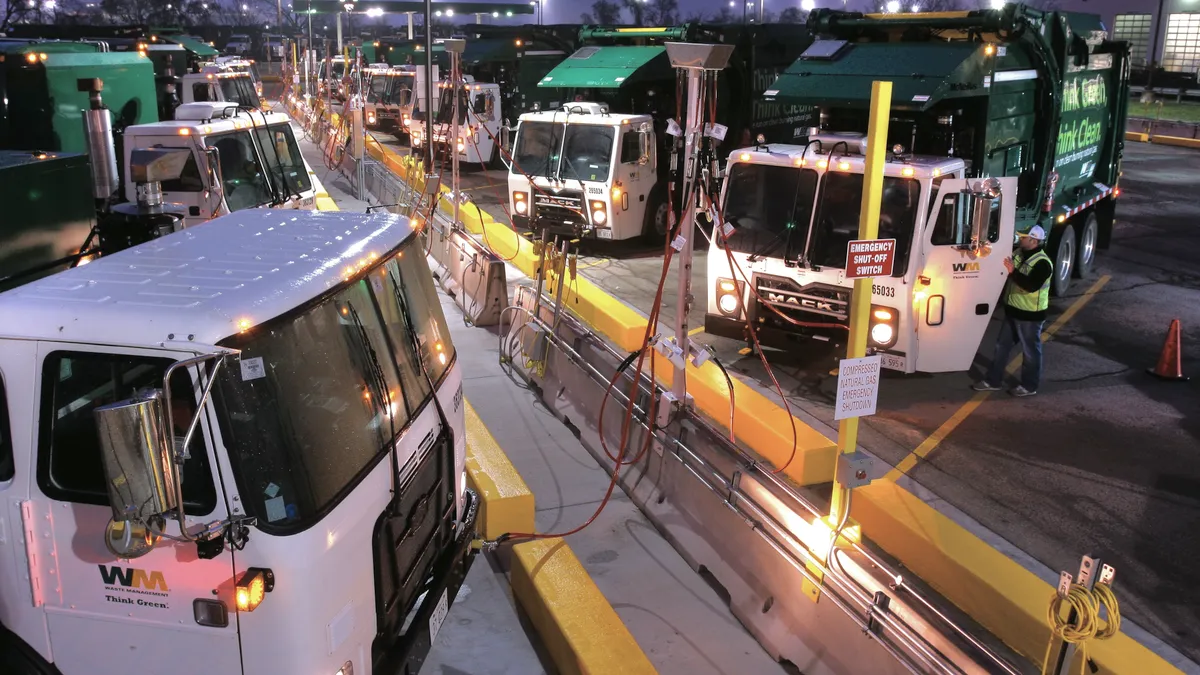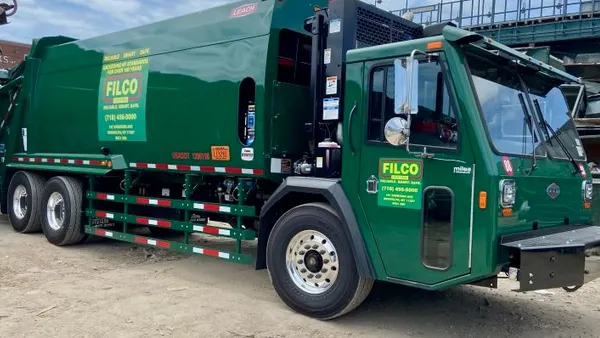Dive Brief:
- Waste Management pulled in $3.68 billion of revenue during the second quarter of 2017 — up 7.4% from the year before — thanks again to the recent volume and yield increases they have been experiencing. The company reported continued strength in recycling commodity values during the quarter, along with a 3.4% increase in overall volumes and a 4.7% increase in core price.
- Some of the Q2 growth was boosted by a $90 million increase in recycling revenues, and Waste Management executives remained cautiously optimistic about that trend continuing — despite the news of a pending import ban on select commodities in China. "Although we do not see a material impact to our overall business, we believe this action does create further uncertainty in forecasting recycling price levels," CEO Jim Fish said during the earnings call, citing his company's sorting capabilities around the targeted commodities.
- The company's technology investments, including route optimization and customer service interfaces, were listed among their top priorities during the call. Fish also talked at length about how artificial intelligence could help with predictive maintenance and eventually be used on routes. Waste Management plans to start small by testing out an autonomous prototype at a landfill and a material recovery facility within the next year. "The technology I think is moving pretty quickly there, but public perception and government regulation have to catch up with that," said Fish. "I think that's a longer-term aspiration for us on our collection business."
Dive Insight:
From a financial standpoint, these results marked another quarter of good news for Waste Management and their highest operating EBITDA in history. Volume increases continued across their landfills and municipal solid waste business, including another double digit increase on the construction and demolition side, with slight improvements on the residential side. Waste Management expects to spend at the high end of its $200 million acquisition budget and will also be buying back $750 million in stock this year. According to Fish, these are signs of a company "hitting on all cylinders."
Whether all of Waste Management's competitors feel as confident in light of news from China, which multiple industry groups have described as potentially "devastating," remains to be seen. The company's executives were far from cavalier about the potential effects, but based on their descriptions of sorting specifications and the make-up of their brokerage business, it may be less of a problem for them than others. Another factor is that the company has been part of a recent trend to restructure recycling contracts to shift more of the commodity risk to customers. Based on their quarterly results, this approach has been paying off, though it has also opened them up to competition in some cities. The protracted discussion about whether Waste Management will retain a recycling contract in Houston wasn't referenced in the call.
Since taking over as CEO last year, Fish has made more of an effort to put Waste Management in the middle of forward-looking conversations about the industry's technological future as a way to differentiate from his competitors. One reason may be the growing prominence of newer companies that tout their technology as superior to the traditional players, though Waste Management rarely gives this public recognition aside from some memorable discussions at this year's Waste Expo.
The first phase of the company's Service Delivery Optimization initiative — which put tablets in trucks around the country to help streamline and track a host of operations — is now seen as almost complete. The next step, according to Fish, is to move beyond the savings they've found in pre- and post-trip inspections. He estimated that only about 30% of their routes are "truly dynamically routed."
As their search continues for a chief technology officer, Fish said routing and logistics experience will be more important than a traditional IT background. This investment will also focus on customer-facing technologies and maintenance, more so than flashy items such as driverless collection vehicles. Though the fact that Volvo, one of their main equipment suppliers, is already experimenting with the concept in Sweden, shows the conversation may be advancing faster than anticipated.
Winning contracts and controlling market share is still key, but as technology begins to shift, businesses across many industries are trying to take advantage of the edge it can provide. Waste Management's self-described position as "the leader in the industry" on technology could be an expensive one to maintain, as other large competitors pursue similar goals. This, along with a favorable acquisition climate, may also further accelerate the trend of industry consolidation.










